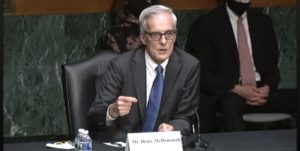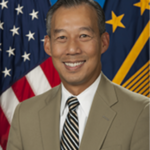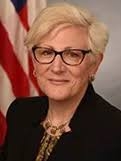WASHINGTON — After what was a relatively easy, bipartisan confirmation process,
President Joe Biden’s pick for VA secretary, is expected to be sworn in by early February.
McDonough joins a swath of other political appointees taking over positions at the top of the department. During the confirmation, he told Senate leaders that, despite not having served in the military himself, he would be a “staunch and fierce” advocate for veterans.
The small amount of friction that developed during his confirmation hearing centered around VA’s implementation of its new community care network through the MISSION Act. That act, which went into effect in summer 2019, replaced the much-criticized CHOICE Act and is an attempt to modernize, expand and consolidate VA programs that give veterans access to care from non-VA providers.
While legislators on both sides applauded the choice it gave veterans and saw it as part of the solution to long VA wait times, Republicans were more bullish on the program, while Democrats were concerned that it would come at the expense of funding for VA facilities. Some Democrats went so far as to call it a step in the direction of privatizing VA care.
“President Biden’s campaign and your answers to my [prehearing] questions talked about rebalancing community care,” Sen. Jerry Moran (R-KS), the ranking Republican on the committee, told McDonough. “I worry that these plans, depending on what those words mean, may erode the core tenets of the MISSION community care program, and that would be a redline for me.”
Moran said he was particularly worried that McDonough would attempt to narrow access standards.
“Veterans have come to rely on those standards over the past two years,” Moran declared. “One of the difficulties we’ve had in the move from CHOICE to MISSION is that things changed. Veterans got accustomed to something and then it changed to something new. If confirmed, will you hold the current access standards?”
As with many of the questions posed by the committee, McDonough’s answer was that he would work “in consultation with” Congress.
“Community care will continue to be a key part of how the department cares for its veterans. Full stop,” he said.
Biden had made promises during his campaign that he would strengthen community care requirements however, ensuring that community physicians recruited by the program live up to VA’s standards. Throughout the short history of the MISSION Act, one of the issues regularly cited by Republicans and Democrats alike has been the absent or underused quality-of-care metrics for community providers.
During his campaign, Biden said that, if a community care provider is found to not meet VA’s standards, their patients would be referred back to VA. This language in particular alarmed Moran.
“This contradicts the MISSION Act’s intent by overriding the veteran’s choice,” Moran said. “The MISSION Act was written to allow the veteran and his or her provider at VA to make a choice for care based upon the best interests of the veteran. Is there anything there or in the Biden administration’s plans that I should have concern about overriding that decision?”
McDonough assured him that there was not.
In a later discussion about serving rural veterans, McDonough touched on community care again.
“Any credible strategy as it relates to rural care for our vets has to have at least three components,” he said. “There’s community care [which] has to ensure the more timely payment of bills [to providers] and a more vibrant network of providers—providers who want to be part of that network. And in both of those cases a higher set of expectations for the third party administrator is wise. Second thing is using access to new platforms … consolidating those gains and growing those. Third is getting more aggressive about using the authorities you have given the department to recruit and fill the vacancies in the facilities we already have.”
McDonough also quelled fears on the opposite side of the spectrum.
“[Regarding this] trend we’ve seen in recent years towards privatization, I find that veterans, by and large with exception, feel the quality of care they’re getting at VA is very good,” noted Sen. Bernie Sanders (D-VT). “[Will you commit] to reverse efforts toward privatization and adequately fund VA?”
While McDonough did not concur that community care equated privatization he assured Sanders that “every decision I make will flow from two principles: Does it increase access, and does it improve outcomes.”
McDonough, who was absent from most speculators’ shortlists of potential nominees, was White House chief of staff under President Barack Obama. He served in that role during the 2014 Phoenix VA wait-times scandal, which led directly to the CHOICE Act and later to the MISSION Act. McDonough also served as deputy national security adviser and chief of staff of the National Security Council. He would become only the second nonveteran to hold the top post at VA.
Biden promoted, to acting VA secretary during the interim between his inauguration and McDonough’s expected confirmation.
Biden also announced several key political appointees to leadership spots at VA. Those include Paula Molloy, PhD, assistant secretary for Human Resources and Administration/Operations, Kayla Williams as assistant secretary for the Office of Public and Intergovernmental Affairs and Chris Diaz as acting VA chief of staff.





